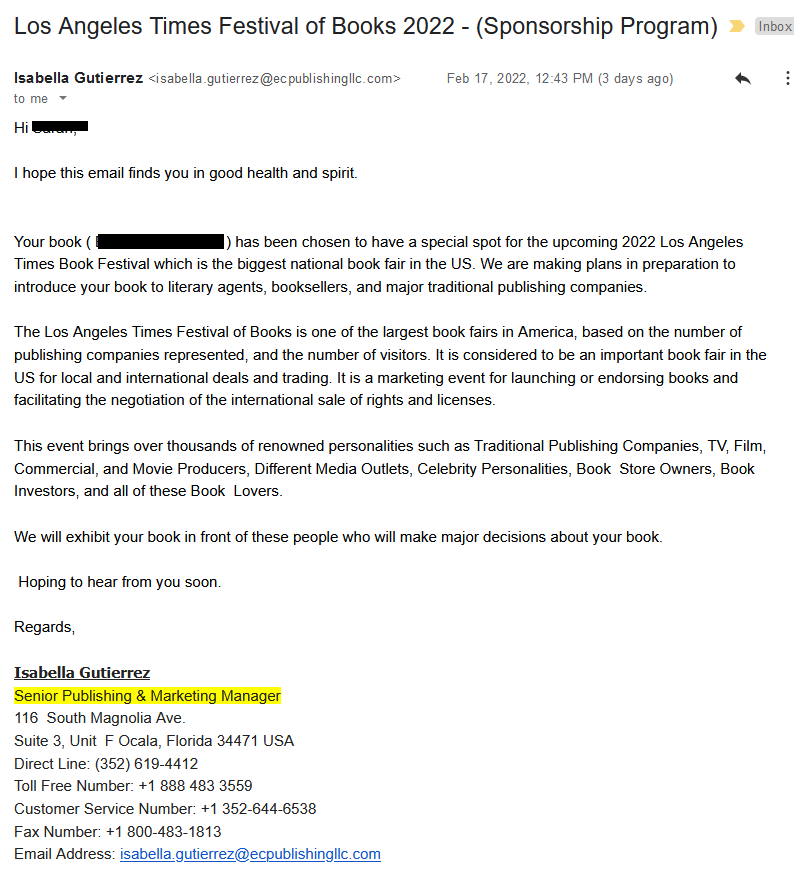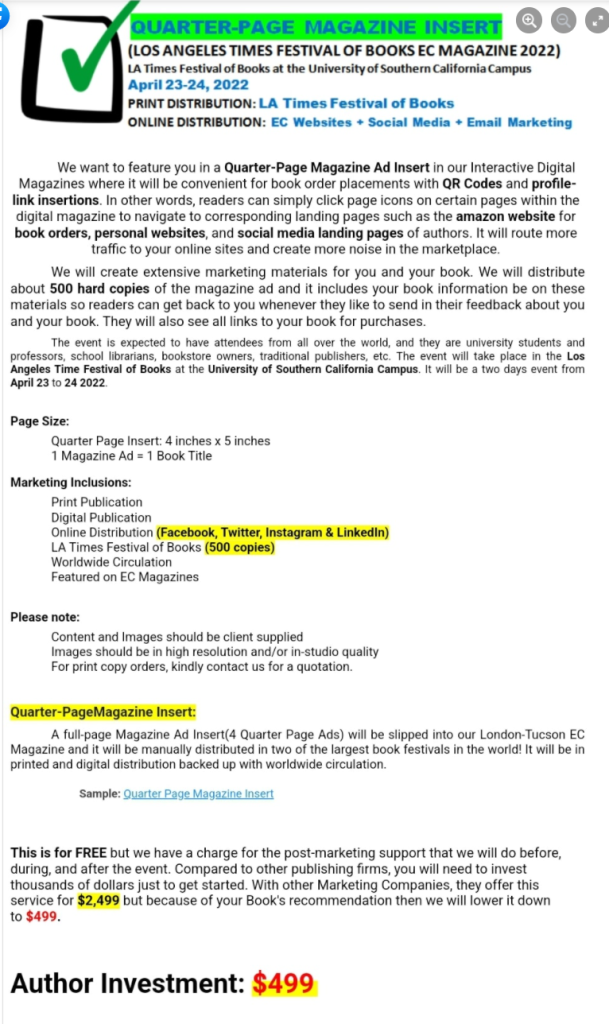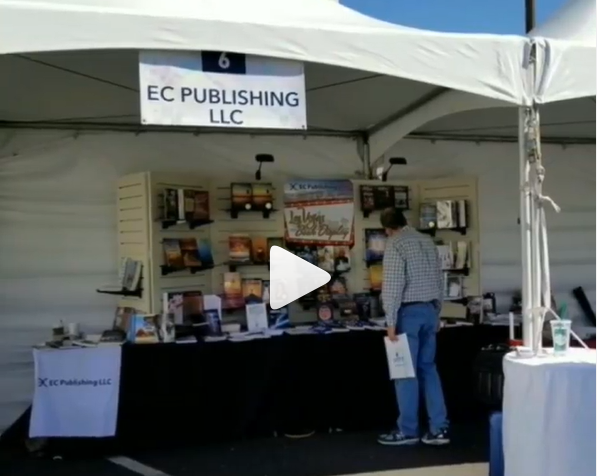
What Is Junk Book Marketing?
As I define it, it’s one-size-fits-all marketing that’s inexpensive to provide, can be (and usually is) sold at a huge markup, and is often of dubious value for book promotion.
Press releases are a good example. They’re the sort of thing that “everybody knows” should be part of a PR campaign. Like any worthwhile marketing or promotion, however, they need to be tailored to be effective: recipients must be carefully targeted and followed up on.
If blasted out to a list of unvetted addresses (such as that list of thousands of librarians that some email spammer may have pitched to you at some point) or posted to online press release distributors (where they will drown in an ocean of thousands of others), they are all but useless: in other words, junk. And sellers of press release services often charge astronomical prices: for instance, AuthorHouse’s “web-optimized” press release will set you back $1,299. That’s a pretty nice profit for cutting and pasting an author’s bio and back matter into a press release template and clicking “publish” on PR Web.
I’ve written about several junk marketing offerings: vanity radio, pay-to-play magazines, book-to-screen “services”, and in one case, a bookstore charging shelf fees. Others include “cinematic” book videos or trailers (these can be an entertaining novelty, but not when they consist of stock images and robo-voiceovers on little-viewed YouTube channels), paid reviews (often sold for two or three times the cost of buying them yourself), social media campaigns (canned tweets and Instagram posts on accounts with no user engagement), print advertising in venues like The New York Times and PW (thousands of dollars for a small section of a group ad), and more.
A major pioneer of junk marketing was Author Solutions (the parent of “supported self-publishing” imprints iUniverse, Xlibris, AuthorHouse, Trafford, etc.), which began offering cheap-to-provide marketing services in the early 2000s as an adjunct to its paid publishing packages. By the time Author Solutions was sold to Pearson in 2012, marketing services represented one-third of its revenue. And no wonder: while the average buy-in for an Author Solutions publishing package was only around $1,400, the expected “lifetime value of an author relationship” (i.e., how much the author could be persuaded to spend on add-ons) was $5,000. Pretty lucrative, in other words.
Today, hundreds of companies offer Author Solutions-style marketing services, hawking them via aggressive cold-call phone and email solicitations that at best over-hype, and at worst actively falsify, any potential benefit. Many of these companies, such as the ones on this list, are scams, as likely to take the money and run as to deliver the paid-for item. But even those that aren’t should be approached with caution, because of the risk of spending money on services of dubious worth and quality.
Selling Book Fairs
Book fair “representation” is one of the more common junk marketing offerings.
The promise: to display the author’s book at a major industry event such as the London Book Fair, where it will supposedly receive unparalleled exposure to the publishing and literary professionals who flock to these events. The cost: anywhere from hundreds (to display the author’s book on a shelf in a booth) to thousands (for “featured” placement, posters or flyers or banners, a listing in an exhibitor catalog, book signings, and more).
Why is this junk? Because, beyond the high expense and misleading hype, the cost-to-benefit ratio is not in your favor. Publishing industry fairs like the Frankfurt Book Fair or the conferences put on by the American Library Association are primarily for industry professionals to network and talk to one another; they focus on rights sales and pre-publication marketing, and are not author-centered or even really author-friendly events. Even at the more public-facing fairs, such as the Tucson Book Festival, individual authors will struggle to be noticed.
If you’ve paid for a signing slot, you may make some sales–but with all of the expenses involved (the cost of the slot, travel, food, and depending on who you’ve signed up with, possibly the books themselves) it’s quite likely you will lose money. If you’ve just bought exhibit or display, your book won’t receive any kind of individual support or hand-selling: it will merely sit on a shelf with dozens of others, in a booth alongside scores of others. Especially at the larger, busier fairs, it’s the equivalent of putting your book down on a seat in a busy airport and hoping someone will pick it up.
Before the pandemic, book fair representation pitches were a favorite of marketing scammers: easy to sell, and, because of the large number of authors who could be recruited for any single event, extremely profitable. Covid put a dent in that, once it started shutting down in-person events.–but now that book fairs are revving up again, marketing scammers are dusting off their book fair solicitation playbooks.
Here’s one from EC Publishing that has been doing the rounds:

The cost, which strategically is not mentioned in the email (or on EC Publishing’s website) is $499. This purchases two books on a shelf in the EC Publishing booth (not for sale, just display), plus a quarter-page ad in EC’s festival magazine (you can assess the quality of this publication here) that includes a QR code for Amazon. Since no one can buy a book at the event, the phone pitch that follows the email is all about exposure: literary agents! TV and movie producers! Traditional publishers looking for indie books to re-publish!
The author who sent me the solicitation below was offered just the ad–but at the same price as the display booth package:

Note the classic flimflam: the product is FREE! You just have to pay shipping and handling.
So that’s the hype. Here’s the reality:

Even with a less low-rent presentation, a passive display like this is unlikely to do anything to boost your sales or advance your writing career.
Other book fair offers I’ve seen recently come from Best Books Media, The Regency Publishers, Meraki Media, and Mainspring Books. All are on this scam list, as is EC Publishing. I expect the volume of solicitations will increase over the coming months…so be aware.


I got one of these years ago, promising to get my book displayed for only $499.00. I wrote back, delighted, and told them to send payment to my Paypal account ASAP. Then I refused to “understand” that I was supposed to pay them. That got me off their mailing list! 😀
I have gotten several emails and a phone call from Meraki Media and Regency Publishers, all wanting $499-600 to display my second Ki-Chan: Demon Hunter book. They congratulated me on being an author since 2015, then got hostile on the phone when I told them I’m not paying a dime for a free book fair. Then the guy from Regency called me back to claim he could re-publish my book, but only if I made my main character underage, Caucasian, blonde, and in love with the antagonist who took out her family and NOT with her boyfriend, who is actually a decent person. He said I needed more drama and that having a teenager in love with an adult demon was just the thing. I said he’s still not getting my money and I don’t peddle Spike and Buffy smut.
Thanks as always Victoria. I recently checked out Author Solutions and a book fair in Mexico. I figured the $1500 price tag on them obtaining a booth was just that and then, for every author they scammed into having their book at the fair was $500, you can imagine how lucrative this business is. Especially, as there is no guarantee. When they told me that my book had already been selected I knew it was an outright lie as the acceptance for new books deadline had already expired. And, the bottom line is – even if, on the off chance, that a legitimate publisher wanted to PAY ME to re-publish my book for the third time – there are still no guarantees for fame or riches! I am both an artist and a writer – but I do it for the creative pleasure and enjoyment of myself and my fans! And, BTW, Chuck, dreams are goals with deadlines – so use all the free use of social media and networking – it may be time consuming, but at least you are not wasting any money and far more fun just to see what might happen! Good luck out there to all of us “self-publishers”!
I just got a call from EC Publishing. They were only marginally coherent with respect to what they could offer me and claimed to be in a partnership with amazon. They mentioned nothing about a price in their spiel, and suggested that they could do more to promote my book than my publisher, which is Knopf. All the earmarks of a scam to me.
You are so pathetic Victoria. Get a life. My dad published his 3rd book with EC Publishing and it’s sure a success. They’re the best self-publisher that my dad went to, made sure all services are fulfilled and they have us transparent royalties as well. So why are you out here defaming them that they’re a scam? Crazy woman
Given that EC Publishing is mad at me because I haven’t taken down a Facebook post it’s upset about, I’m guessing that Stacey and her dad are just a bit fictional.
Thanks for your article as well as the previous replies. I just spent thirty minutes listening to EC publishing’s pitch to get me in the Frankfort Book Fair, all for $499. Thanks for the head’s up. The materials and pitch they sent match your examples. Terry Engel
Thank you for your article. I just got off the phone with someone about this. I didn’t sign up.
Thank you for your diligence. I almost fell for one of these book fair scams.
I’m sadly sucked into dealings with Writers Branding and The Regency Publishers, only after being burned a couple of iUniverse sharks. Been working on getting my book to take off for several years and thought I was with a good group with the Regency. I’ve attached my latest faux pas that I fell for and wonder if I can get my $1,000 back. This is copy of email pushing me to sign agreement. See below.
Current e-mail:
Hello Deborah,
I hope that this email finds you well, this is for our documentation purposes wherein you agreed to make your initial payment yesterday.
The only thing that I am asking for you to do is to reply “YES” to this email.
This is to certify that I, Deborah Warley authorized The Regency Publishers to charge me for $1,000 as the first payment for the total amount of $2,000 for the services of “Standard Feature Magazine + Catalogue Entry for Frankfurt Book Fair + 2 weeks of Social Media Marketing + 1 year Literary Representation” which the card used for this transaction was ending in 3310 dated 04/21/2022.
Thank you, and have a wonderful day.
I asked for literary agent who would inquiries to traditional publishing houses that they are supposedly partnered with. Maybe they are but I’m afraid not after your finding them on your scam list for book fairs.
My question is, since I have NOT SIGNED the agreement , can I demand my payment back?
Also, where does one go to find a trustworthy literary agent? Several years I read that I would need one because the average persons inquiries went into piles of other which may take 3 to 4 months to get read but they may never be reviewed. I am very glad I stumbled across Writer Beware…It could have saved me about $20,000. I’ve been told so much of your same scam alerts. My family is full if trusims. Grandma used to tell me, ” A wise man learns but a fool never does!” … another favorite…”We too soon get old and too late get smart!”
My book is about how to search for fragrances based upon my theory about blood/personality types matched to fragrance families. There are basically 4 of each and this actually works.
Thanx for some honest advice.
Deborah Worley
Author, Scent-sational Searches
Hi, Deborah,
The Regency Publishers is an imprint (for lack of a better word) of a group that now calls itself Czilk DC (formerly Chrosan OPS). Based in the Philippines, it has several other “imprints”, all of which operate in more or less the same way. All are scams. They have no connections with publishers or movie producers/studios: their sole aim is to get you to pay them for “services” that at best are overhyped, and at worst are simply lies.
How did you pay? If by credit card, you can file a dispute and possibly get your money back that way. Unfortunately, more and more of these scams are requiring wire transfers or payment via apps like Zelle or Venmo–which have much less accountability and make it extremely difficult to dispute the charges and get the money back.
For literary agents, please have a look at Writer Beware’s Literary Agents page, which offers information, advice, cautions, and links to resources that will help you search for an agent.
Have you written about NFTs yet? Those are obvious scams, and they seem to be targeting authors lately. Half the posts on twitter in any search tag related to art or writing are about NFTs. It’s kind of concerning. Like, do I need to block every NFT poster? If someone reposts my art and tags it with NFT, can I be held responsible in some way if someone gets scammed by that poster at some later point? Half the author promo posts on self-promo sunday get reblogged with NFT tags.
I haven’t written about NFTs yet, but I’m aware that this is a developing area of predation, and I definitely have my eye on them. Can you point me to an example of re-blogged promos that have gotten NFT tags? Email me if you prefer: beware@sfwa.org
It seems especially cruel, playing off people’s dreams; but I suppose all cons do that.
Great info ..I get dozens of these emails a week…